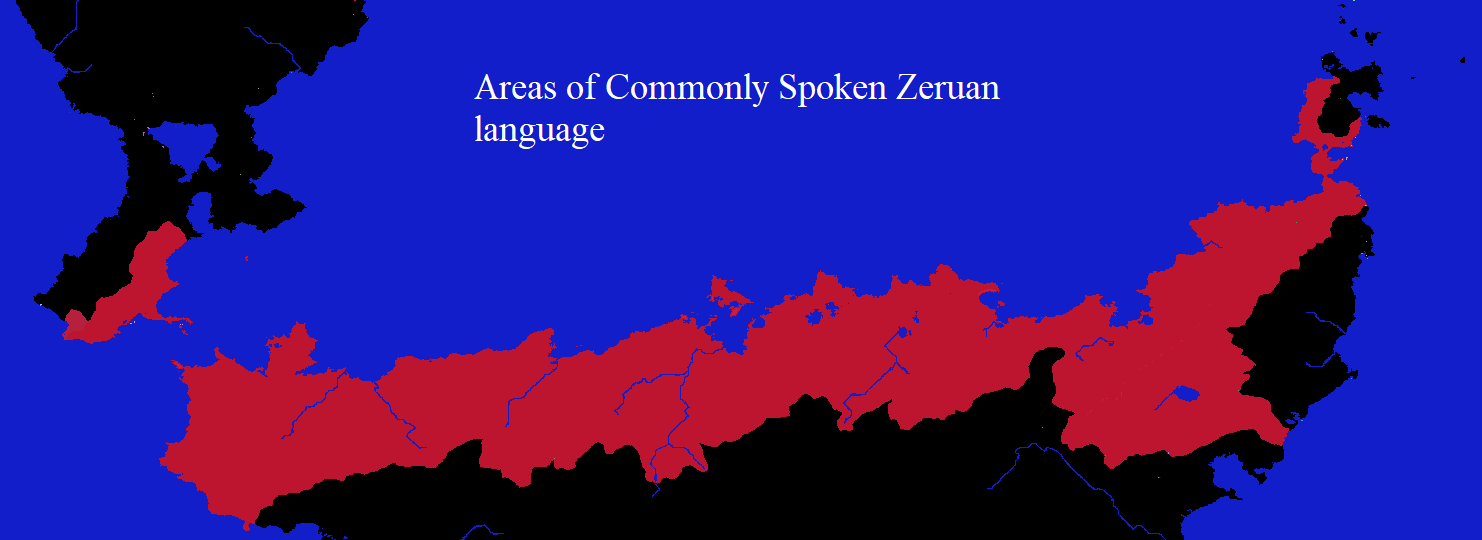Zeruan language
Zeruan was once a hybrid tongue of the many ancient local dialects of Northern Ekraht. Over time, after many eruptions and social collapses forcibly mixed and scrambled the Northern flatlands, the hybrid trading language replaced many of these local languages as the main spoken tongue. The Empire of Zerua has codified this language into a codified set of words and grammar as a way to bind the empire and its orbiting states together.
As the Empire and its corporations have risen, the language has spread with it. Now, Zeruan is spoken far and wide. Even merchants far to the South speak Zeruan between each other as the language of finance, and virtually all business agreements are done in Zeruan anywhere on the continent.
In an effort to bind the language to imperial authority, a 'College of the True Word' has been founded to regulate 'true Zeruan'. This College holds little power and primarily serves as gatekeepers for the literary elite, though - while they despise slang, they inevitably accept it after a decade or two.
God-derived Names
Generally speaking, Zeruan is a mashup of Basque and Xhosa. While these are linguistically mulched beyond most recognition, you could probably dabble a bit in either Basque or Xhosa in a pinch - with Basque indicating an ancient Western Zeruan name and Xhosa indicating an ancient East Zeruan name.
Zeruan Names
Zeruan names are common across Ekraht, having traveled through the trade lines.
Some of these have associated meanings listed
- Uyazi (beloved child
- Mayara (warrior)
- Mazala (sailor)
- Maina (beloved)
- Ayba (child of mine/related child)
- Sareba (royal)
- Sirba (warrior)
- Yara (Warrior)
- Balwa (moon-borne)
- Kamatu (dragon-keeper)
- Makoi (one who cries - also name of Ancient Zeruan emperor)
- Mabar/Mavar (one who laughs)
- Koyevi (Cries too much)
- Artay (herder)
- Ilwar (moon)
- Metu (brings healing)
- Erila (bee monarch)
- Kyan (cat)
- Kyatzin (cat)
- Akua (little cat)
- Iago (leopard)
- Mu'kya (humanoid cat)
- Mazaru/Mazara (gift from the sky)
- Ezia (dolphin-like)
- Atya (wanderer)
- Amafa (Iron-willed)
- Zanar (lobster-keeper)
- Fara (Ghostly)
- Zofara (old soul)
- Ewala (makes song)
- Saza/Sakira (little sweet one/like sugar)
- Taina (breath of life)
- Wayda (lighting bearer)
- Ekeba (storm-born)
- Taisha (survivor)
- Sashaba (child of the bay)
- Ishuwa (shortening of "they who bear the river of fire")
- Marraf (has red flower)
- Izlo (loud)
- Zenkara
- Sunaba
- Elzela
- Wenaldo
- Zalgita
- Dumenkar
- Aswafara
- Arnasha (the incarnation of breath)
- Kifaro
- Farema
- Marziket
- Zaltaba
- Yoshaba
- Tashaba
- Amina
- Zotula
- Ortrua
- Umafti
- Madua
- Taihoshta
- Gashri
- Kemego (draconic)
- Awazala
- Hekesha
- Ruwid
- Metu
- Swentu/Swenta (quiet)
- Ikdiri (little acorn)
- Zentu (one who dances)
- Mithetu/a (one who is fond of speech)
- Barazetu/a (steel-essence)
- Toritu (one who works with birds)
- Toriba (birdlike)
- Mibora (drummer)
- Sophan/Zophan
- Aizuda ("reveres Aizu", Aizu being the principle of Air in Kamada)
- Zokeshta (distortion of "Zowahsta", God of order in Kamada)
- Ilona (after the prophetess of Kamada of the same name)
- Ikarzasha (after Ikarza, goddess of monarchs in Kamada)
- Umasa (after Umasu, the snake that supports the world in folk religion)
- Arzibesh/Arzibasha (after Arzibesh, traditional goddess of the heavens in Makal )
- Sarzara (another traditional sky God in Makal)
- Zalta (the traditional boat-master of the dead)
- -zir: the lineage of
- -uya: little
- -tzi: diminutive
- -ago: huge
- -egi: excessive, legendary
- -hegi: border, in between
- -tu: one who does
- -zea: essence of
- O-: of bread or plant
- Ba-: someone from
- Ma-: Some who does
- Hara-: of meat
- Erla-: of bees
How to Generate New Zeruan
Geographical Distribution
Zeruan is spoken as a common tongue in the Empire of Zerua and its tributaries - especially on the state level. It is also the religious lingua franca of the religion of Kamada and the trade tongue of the continent of Ekraht.
Dictionary
Where Zeruan is spoken as a day-to-day language. Dialects vary based on region, as anywhere
Spoken by
Remove these ads. Join the Worldbuilders Guild




Comments